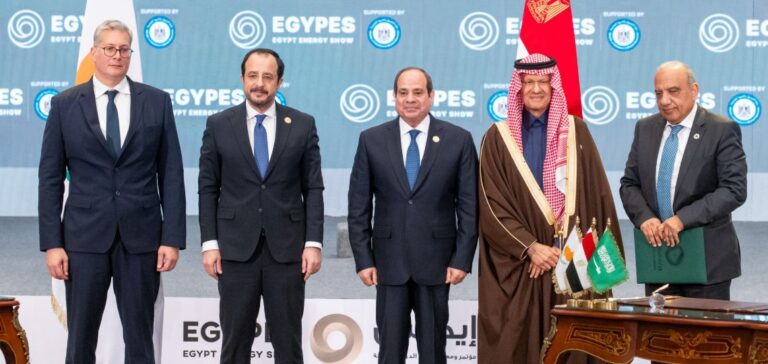The collaboration between TotalEnergies and ENI with Cyprus and Egypt marks a significant step in the exploitation of gas resources in the Eastern Mediterranean. The Cronos gas field, discovered in 2022, is one of the region’s strategic assets, with potential confirmed by tests conducted in early 2024. These results validated the project’s feasibility and paved the way for increased gas exports to Europe.
A Structured Framework for LNG Export
The agreement provides that gas extracted from the Cronos field will be transported to the Zohr offshore facilities, a major gas field in Egypt. The gas will then be processed before being transferred to the Damietta LNG liquefaction plant in Egypt. This facility, with available liquefaction capacity, is a key asset for optimizing exports to the European market.
The project is part of a regional dynamic where Egypt plays a central role as a gas hub. This positioning allows the country to leverage its existing infrastructure to meet the growing demand for LNG in Europe, as diversification of supply sources becomes a strategic priority.
Expanding Gas Reserves
The area known as “Block 6,” where the Cronos-2 well is located, is one of thirteen zones identified within Cyprus’s Exclusive Economic Zone (EEZ) as potentially rich in gas. Before the discovery of Cronos, other fields had already been confirmed in this region, including Calypso-1 in 2018 and Zeus-1 in 2022, strengthening the interest of energy operators in this zone.
TotalEnergies holds a 50% stake in the project, alongside ENI, which acts as the operator. Together, these companies are working closely with Cypriot and Egyptian authorities to structure a development and production plan suited to the Cronos field’s resources.
Infrastructure Optimization for Fast-Track Production
Utilizing existing infrastructure is a key lever for accelerating the commercialization of extracted gas. According to Julien Pouget, Director for the Middle East and North Africa at TotalEnergies, this project aims to capitalize on “existing facilities offering available liquefaction capacity.” This approach avoids significant investment in new infrastructure and optimizes the production timeline.
The next steps will focus on developing a comprehensive plan for the gas field, in coordination with Cypriot authorities. The objective will be to maximize export volumes and align production capacity with the growing LNG demand in Europe, where supply diversification remains a strategic imperative.






















